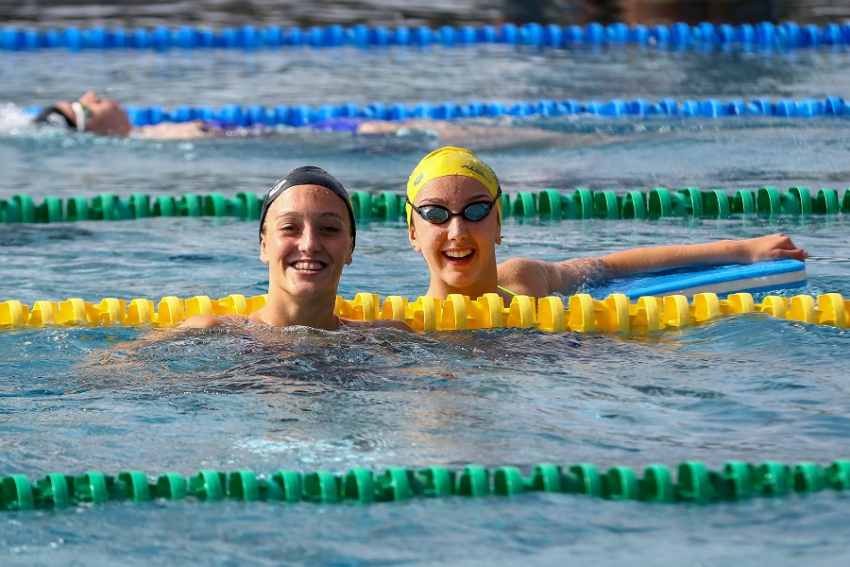Struggling to work through setbacks and deal with pressure? Try this tactic—giving yourself the same advice you’d give a teammate.
Giving and receiving advice is a funny thing.
When a teammate has a bad race, bombs the main set at practice, or doesn’t make the cut they worked so hard for all year…
We’re full of exceptional, balanced reason.
It’s okay. You’ll bounce back. It’s just one race. You’ve bounced back before. Think how far you’ve come. You’ve got more chances to shine. You can still make the cut in a different race.
And so on.
But when it’s you trying to give yourself that same advice when in the same situation?
Welp, not so much.
Remember the Great Advice You Give Others
This is going to sound hokey, but for a moment think about a teammate that is going through the same difficulties as you.
Perhaps they’ve been training hard for months on end and have been struggling to improve.
(The dreaded swimmer’s plateau!)
What advice would you give them?
Probably something like:
- Work on remaining optimistic
- Keep doing what they are doing
- See if they can find little ways to improve where they can
- Reach out to coach for ways to break through
- They aren’t going to improve by quitting
- Your parents still love you and coach still has your back
And so on.
This is in stark contrast to the charged, emotional, and sometimes surprisingly cruel advice we give ourselves when we stumble:
- I don’t know what I was thinking, I was never going to make that cut
- I shouldn’t even have tried
- I’ll never live up to my potential
- My parents and coach are going to be so disappointed in me
- I’m not a good swimmer
You get the idea.
The next time you hit a setback or perform below expectations, sit down with your journal or log book and write out the advice you’d give a teammate in the same situation.
Writing it out—and this is key, you can’t just ruminate on it in your brain, because you will quickly revert back to the charged self-statements faster than Caeleb Dressel gets to 15m—gives you emotional distance and allows you to make better decisions and judgements.
Being able to step back and give balanced and reasoned advice to yourself—instead of going full-blown kneejerk emotional overreaction—will help you bounce back faster.
And perhaps best of all, you will learn to trust yourself that no matter how well or how poorly things go, you will react in a manner that will benefit you best in the short and long term.
Giving Advice Gives Trust to Your Thoughts
There is one more reason that I love this little exercise.
It helps to organize your thoughts so you can develop trust with yourself.
In my competitive days, I often found myself mentally scrambled, for a variety of reasons.
Maybe I wasn’t progressing fast enough towards my goals, and the stress and pressure built up to the point that I made counter-productive decisions.
(“Not going to achieve my goals? Welp, I’ll solve that problem by not going to practice at all!”)
Or maybe I was so frazzled before a big race that I found myself getting caught up in everything that was going around me instead of taking things step-by-step.
In both cases, I wished I’d used an emotional distancing exercise like this.
Because no matter how often my coach told me these things, or how many teammates said them, the person I trusted (or mistrusted) the most was myself.
And learning to trust the things you say to yourself are true and reasoned is a killer tool in helping organize your thoughts and steer your mindset in the right direction.
Ways to Implement Better Self-Advice
- Talk to yourself in the third person. Seriously. When we talk about ourselves in the third-person, we increase our ability to use reason. You got this vs I got this consistently works better with self-talk.
- Look at your situation from the outside in. When we view the challenges we face as an observer, we become much more objective about what we are feeling. Give the advice you’d give to a teammate.
- Journal the story of yourself. Using that third-person when journaling is another way to give yourself distance to make more reasoned decisions. This is especially handy in stressful situations (pre-race nerves!) and after setbacks (bombed main set).
More Stuff Like This:
This Mental Training Workbook Will Help You Swim Like a Rock Star This Season. Confused about mental training? Want to unleash pro mode on your swimming this year? Learn how this mental training workbook will change your mindset and help you pummel your PB’s this season.
Why You Should Be Grading Your Effort After Practice. One of my favorite ways to stay consistent and accountable in practice is this simple technique. Takes about three seconds, and will keep you honest about the effort in the water.














